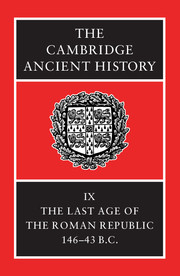3 - Political History, 146–95 B.C.
Published online by Cambridge University Press: 28 March 2008
Summary
Roman morality and political harmony were at their height, wrote Sallust, between the Second and Third Punic Wars. After this came the evils that accompany prosperity – strife, greed, ambition and the pursuit of ascendancy by powerful men. The inadequacies of this kind of explanation and of the precise dividing line drawn here by Sallust were discussed in chapter 1 (pp. 7–9). In spite of this there is no doubt that the razing of Carthage introduced an era of political crisis, whose antagonisms recalled the dimly remembered struggles of the early Republic and brought into question the stability of the constitution which Polybius admired.
Polybius thought that the common people were wronged through the greed of some men and given a false sense of importance through the ambitions of others. These exploited the truculence and recklessness of the poor in order to dominate the constitution and created what was in name democracy but was in fact mob-rule. Modern scholars are in general reluctant to recognize so dramatic a change, at least in Polybius’ lifetime. The present writer has argued in an earlier book that the violence of the late Republic should not be regarded as the result of a sudden reversal of Roman values but the re-emergence of long-standing attitudes and conflicts, which had been temporarily suppressed by political prudence and the profits from success abroad. On the other hand, it is not excessively superficial to look to the personalities of men like the Gracchi and see in their imagination and resolve the initial moment of a new political process. However, this can only be done when we have discerned how much of the late Republic was already present in that middle period renowned in Sallust’s eyes for its moderation.
I. THE ROMAN CONSTITUTION IN THE SECOND CENTURY B.C.
Aristotle would have treated the Roman constitution either as a mixture of the basic forms of constitution (monarchy, oligarchy and democracy), as Polybius did later, or else as one of the more moderate forms of democracy, close to the ill-defined border he drew between this and moderate oligarchy. The Roman body politic was not completely in the power of either rich or poor; all citizens to some extent participated in politics, but the law was sovereign, and the few offices were only available to those with a property qualification.
- Type
- Chapter
- Information
- The Cambridge Ancient History , pp. 40 - 103Publisher: Cambridge University PressPrint publication year: 1994
- 3
- Cited by

